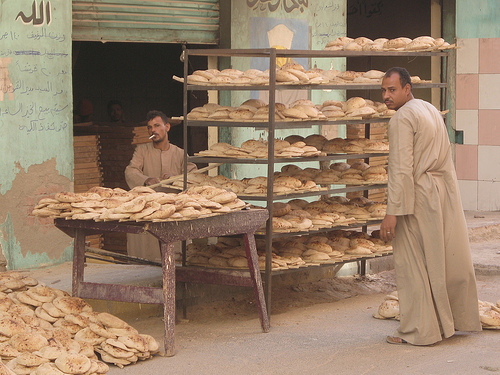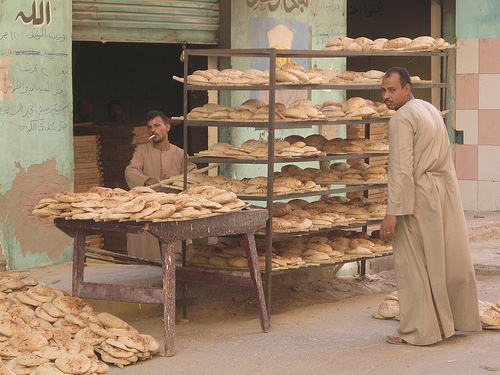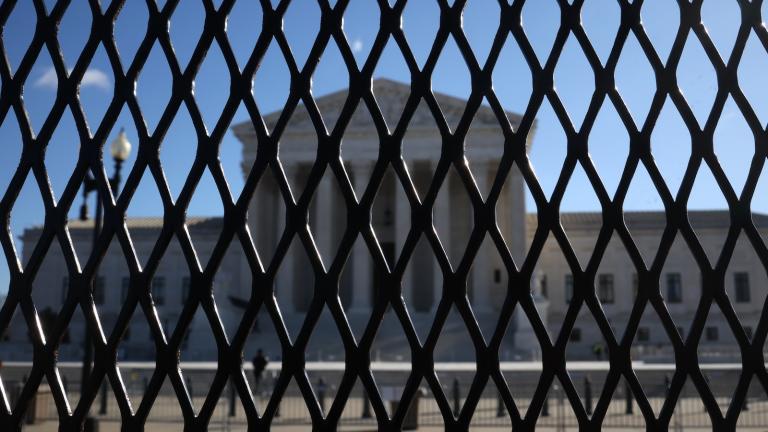 Photo: Joonas PlaanThis is not Egypt’s first time at the revolution rodeo, and previous outbursts were precipitated by the cost of bread. Global food prices are spiking right now, and Egypt, as the world’s largest wheat importer, is reliant on climate-tossed countries like Russia and Pakistan for its food supply. Do commodities prices play a role in the current protests?
Photo: Joonas PlaanThis is not Egypt’s first time at the revolution rodeo, and previous outbursts were precipitated by the cost of bread. Global food prices are spiking right now, and Egypt, as the world’s largest wheat importer, is reliant on climate-tossed countries like Russia and Pakistan for its food supply. Do commodities prices play a role in the current protests?
Food insecurity means political insecurity: NPR reported yesterday on the role of food prices in the recent turmoil:
Political unrest has broken out in Tunisia, Yemen, Egypt and other Arab countries. Social media and governmental policies are getting most of the credit for spurring the turmoil, but there’s another factor at play.
Many of the people protesting are also angry about dramatic price hikes for basic foodstuffs, such as rice, cereals, cooking oil and sugar.
The Food and Agriculture Organization of the United Nations says its global food price index is at a record high, above even where it stood during the last food crisis three years ago. In early 2008, rising prices caused riots in dozens of countries — several of which are now seeing uprisings once again.
Not the major factor in Egypt: David Pollock at the Washington Institute for Near East Policy told us he doubts that commodity pricing is a major factor — in fact, he called it a “huge oversimplification.” There are grave inequalities in the Egyptian economy, but it’s the inequalities, not the absolute cost, that people object to. And there’s also, you know, Mubarak:
There are issues of political stagnation, repression, favoritism, corruption — it goes way beyond economics and certainly way beyond just food issues. It all goes together, I don’t think you could disentangle it very well.
In fact, bread may be the thing the government is screwing up least: Egypt is the world’s largest importer of wheat, and wheat prices have been rising. But the Egyptian government also subsidizes staple food items: 70 percent of Egyptians rely on subsidized food. Since the 2008 riots — which really were about bread — the government has been keeping food prices for basics relatively stable, says Pollock:
A lot of the population lives on the edge economically and they do feel the effects of a jump in food prices, and Egypt does have to import an awful lot of its food, so it’s very vulnerable to global commodity pricing. All of that is true.
But food prices for basic items are heavily subsidized in Egypt … there are rations and subsidized goods of inferior quality available at very very low prices, and these parallel markets for better and more freely available flour or bread or rice or cooking oil that are available at more like market prices.
… Two years ago there was another issue when they tried to raise bread prices, cut subsidies, and all of a sudden there wasn’t enough of the subsidized bread available on the market. People got upset and the bakers were striking and people couldn’t get what they needed, and the government stepped in and said okay, the army’s going to bake bread for you if necessary, and we’ll stop cutting back on subsidies so much and try to keep this on an even keel. And in the last two years that’s more or less the policy that the Egyptian government has pursued, so it would be hard to argue that something that happened recently with food prices or distribution was a direct cause or instigator behind this latest wave of really massive unrest.
But it may have been a major factor in Tunisia: Earlier this month, the Washington Post reported that spiking food prices were partly responsible for the Tunisian uprising:
The state of emergency in Tunisia has economists worried that we may be seeing the beginnings of a second wave of global food riots. Battered by bad weather and increasing demand from the developing world, the global food supply system is buckling under the strain. …
Tunisian President Zine el-Abidine Ben Ali on Thursday vowed to reduce the price of staples such as sugar, milk and bread ,but the pledge wasn’t enough to placate the thousands of protesters who mobbed the capital, Tunis, on Friday to demand his ouster. The country’s prime minister, Mohammed Ghannouchi, has appeared on state TV to announce he is assuming power.
Which was a major factor in Egypt: Pollock told us that the Egyptian unrest is a clear example of the “demonstration effect,” where political developments in one country can catalyze events in another:
People are inspired and imitating and emboldened by what they heard about and saw happening in Tunisia. It takes this kind of catalyst to turn something upside down much more quickly and suddenly and surprisingly than people ever imagined. Once people understood that they can do it if they get to critical mass, that’s a huge psychological change.
Enough isn’t always enough: Reliance on imports can make a country especially susceptible to shortages — from, say, giant protests. Egypt actually has plenty of wheat, for now, but Egyptians are anticipating shortages as the protests disrupt importing. It’s possible that food concerns could hamstring the uprising, even if they didn’t cause it.
In any event, food prices are serious business: Experts may not be tracing the Egyptian revolution back to the cost of bread, but it’s true that food insecurity is a source of civil unrest — not to mention civil injustice. And it’s true that climate change threatens food security. Lowering reliance on imports in the short term and fighting climate change in the long term won’t end political uprising, even food-related political uprising — remember “let them eat cake”? The French peasants weren’t starving because of floods in Pakistan. But it can potentially have political effects far more profound than partisan points scored off cap-and-trade.




